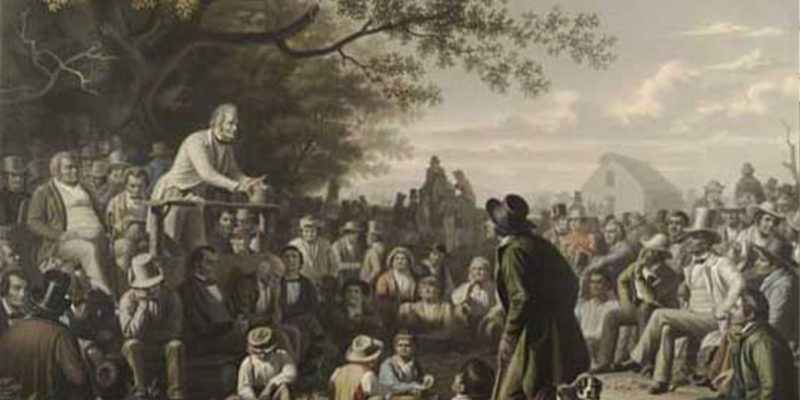Augustine of Hippo’s Confessions and Frederick Douglass’ Narrative of the Life of Frederick Douglass share a common theme of spiritual awakening to the truth. In these texts, both Augustine and Douglass recount how they confronted and changed their corrupt beliefs about religion and morality. They liberated their own definitions of the truth from error, and in describing this process they show their readers how to overcome misunderstanding themselves.
In this paper, I demonstrate how Augustine and Douglass’ awakenings produced their respective achievements of moral freedom. To do so, I examine the moments at which they realize what they had perceived to be truth was no longer defensible. I use these turning points to juxtapose the thinkers’ actions and beliefs before and after their awakenings. Augustine’s realization occurs in book seven, chapters one through six of the Confessions as he comes to terms with the fallacies of Manichaeism (Augustine 2018, 167-174). Douglass’ turning point comes in chapter six of his Narrative, where he finally comes to understand the theoretical foundations of race-based slavery, something that heretofore “had been…a most perplexing difficulty” for him (Douglass 1995, 20). These moments allow each author to find a path toward a newly discovered truth, and these new pathways become their routes to freedom. They both start in bondage to a certain corrupt way of thought—Augustine to the Manicheans’ egotistic philosophy, Douglass to his owners’ false religious beliefs—and end having been liberated from that corruption. The passages I examine highlight both writers’ discovery of their own moral slavery, and how each overcame these bonds and achieved true freedom. Both Augustine and Douglass discover what it means to be human by challenging what they see as wrong and writing about it to encourage others to do the same.
Augustine sought to understand the infinite and incalculable early in his life by embracing Manichaeanism. Though initially attracted by its dualistic understanding of good and evil, he came to reject its fundamental misunderstanding of the divine. In separating good and evil into two abstract, equally strong forces, Manicheans divorce sin from human accountability. By doing so, they claim the power to decide what is evil and what is good for themselves. In essence, Augustine reflects, they teach that “the unchangeable God is changeable” (Augustine 2018, 7:4), and they reject the idea that humans are accountable to a moral standard higher than their own wills. Augustine later determined that his sin of adhering to Manicheanism was especially grave because he did not even think of himself as a sinner at the time (Augustine 2018, 5:10). Manichaeans create an abstract, theoretical vision of evil in the divine realm to avoid acknowledging it in themselves.
This vision soon failed Augustine’s desire to know the truth: “I found my condition awful, and in my pain over it, I doubled that awfulness. If some good fortune smiled on me, I had no interest in laying hold of it” (Augustine 2018, 6:10). Manicheanism did not console Augustine, but rather inspired in him a state of misery that forced him to turn elsewhere in his search for truth and freedom. Unsatisfied with the arbitrary explanations of his teachers, he decided he needed to investigate the cause and nature of evil “in such a way as not to force me to believe that the unchangeable God is changeable…As a result, I confidently set about investigating the cause, certain that the Manichaeans, whom I ran from with unwavering determination, weren’t stating the truth” (Augustine 2018, 7:4). Augustine confronted the delusion, self-deception, and egotism of his previous ideas, and he accepted that he did not need to submit to a philosophy that he knew was morally wrong.
In this process, he ultimately discovered the necessity of submitting, not to human will, but to the will of God. Augustine rejected Manicheanism because it corrupts the biblical conception of power of good and evil and assumes for humans what truly belongs to God. This position, Augustine found, misunderstands free will. While he found that what “lifted me out into [God’s] light was the knowledge that I have a will” and that this “was as sure as the knowledge that I was alive” (Augustine 2018, 7:5), he also realized that he was God’s slave, and not anyone else’s. Augustine describes slavery to God as virtuous and moral: “Master, I am your slave, I am your slave and the son of your female slave. But you have torn my chains apart” (Augustine 2018, 9:1). This is a confusing statement. How can someone be enslaved to the same person who has “torn [their] chains apart”? According to Augustine, all people are called to become servants of the one true God (Augustine 2018, 7:1). They freely carry out his commandments to model their lives after His, with the ultimate goal of union with him in heaven. Augustine became a slave to a benevolent and true God, and in reflecting on his earlier errors, he cries out: “how I burned, my God, how I burned to fly back from these earthly places to you” (3:7). Becoming a slave to God enabled his true freedom.
The spiritual slavery Augustine overcame may seem very different from the physical slavery endured by Frederick Douglass. Yet while Douglass always understood his enslavement as immoral, his own moment of conversion to new understanding occurred when he realized how slaveholders used religion hypocritically and corrupted God’s word to maintain their power. Douglass distinguishes “between the Christianity of this land, and the Christianity of Christ,” and “recognize[s] the widest possible distance” between the two systems (Douglass 1995, 71). Dubbing the former “slaveholding religion,” he shows how Southern slaveholders echoed the Manicheanism condemned in the Confessions, subordinating the power of God to name right and wrong to human dictates. Slaveowners sought to justify owning other human beings by claiming that they must help those individuals become slaves to God, but in practice this led them to demand complete obedience from their Black slaves. They thus presented themselves as a sort of godlike power on earth. Douglass observes that this power encompassed even life and death, for as he notes, “the slaveholders like to have their slaves spend those days just in such a manner as to make them as glad of their ending as of their beginning” (Douglass 1995, 45). In “slaveholding religion,” slaveholders are in control of the beginning and the end.
In their roles as false gods, the slaveholders made “impudence…one of the greatest crimes of which a slave can be guilty” (Douglass 1995, 47). In slaveholding religion, the expectation for one person to show due respect for another is defined by those persons’ races. A Black person can be impudent only to a white person, not the other way around. By construing impudence in this way, white slaveholders demanded for themselves the fear and humility with which all humans ought to revere God. At the same time, they dehumanized Black people by implying that it is impossible to disrespect them. With this power, slaveowners sought to transform the enslaved person from a human being loved by God into an animal with no soul (Douglass 1995, 38). If one is to claim God’s role, one must have subordinates, and Southern slaveholders subordinated Black people like Douglass.
Slaveholding religion, like Manichaeanism, corrupts the relationship between man and God. To the Manichaeans, God is not in charge—it is humans who possess the power to decide what is evil and what is good on earth. With their implicit justification for doing anything to or with another human being, they anticipate the fraudulent claim to omnipotence found in Douglass’ Narrative. In this depraved situation, slaveholders hold the very life of the enslaved in their hands, and indeed Douglass often found himself wishing for death because of this unhappy fact (Douglass 2018, 24). This is very similar to Augustine’s state before his realization that he could freely choose to be a slave of God. While the slavery that Augustine eventually turns to is happy because it is to his loving and compassionate God, Douglass—as the slave of a fraudulent God, an imposter—experienced his slavery as pure misery.
Nonetheless, Douglass also discovered a true alternative to his agony by realizing that his enslavers made it “unlawful, as well as unsafe, to teach a slave to read.” Helping slaves understand that they are more than slaves would mean that “there would be no keeping [them]” (Douglass 1995, 20). The realization Douglass came to is that slaveholders’ false power came from the ignorance of slaves. Hence, the pathway to freedom for Douglass is education, which ensures the transmission of truth and liberation from false morality in addition to liberation from physical enslavement.
Both the slaveholders and the Manicheans recommit the Bible’s original sin in seeking to become more powerful than God has allowed, and by making decisions about the nature of good and evil that no human being has the moral capacity to make. Christianity teaches that original sin is the result of Adam and Eve’s disobedience to God when they ate the fruit of the tree of knowledge of good and evil in the Garden of Eden. For Douglass and Augustine, identifying that corruption in the words and actions of people they once following, and illustrating it for their readers, are essential parts of their missions. Douglass ultimately asserts that “it is against religion, as presented by these bodies, that I have felt it my duty to testify” (Douglass 1995, unknown). Like Augustine, he provides a “confession.” Both Douglass and Augustine know that God serves as their ultimate audience, but they also know that their service to him depends on them reaching out to their audience on earth and teaching them how to find God’s truth. These two authors help we, their readers, remind ourselves that we are not God, lest we commit our original sin over and over again. Who gets to “own” and “master” the definition of God’s truth is at stake for both Augustine and Douglass, but as they seek to free this truth from those who distort it, they also teach us the importance of pursuing the truth ourselves. In examining our thoughts and sentiments, we are compelled to confess and narrate the truth we discover.
Works Cited
Augustine. Confessions. Translated by Sarah Ruden. New York: Modern Library, 2018. Douglass, Frederick. Narrative of the Life of Frederick Douglass. Mineola, NY: Dover, 1995




 Compass is an online journal that provides a space for the work of talented undergraduates who have original and well-articulated insights on important ideas and issues relating to American democracy understood in the broad contexts of political philosophy, history, literature, economics, and culture.
Compass is an online journal that provides a space for the work of talented undergraduates who have original and well-articulated insights on important ideas and issues relating to American democracy understood in the broad contexts of political philosophy, history, literature, economics, and culture.